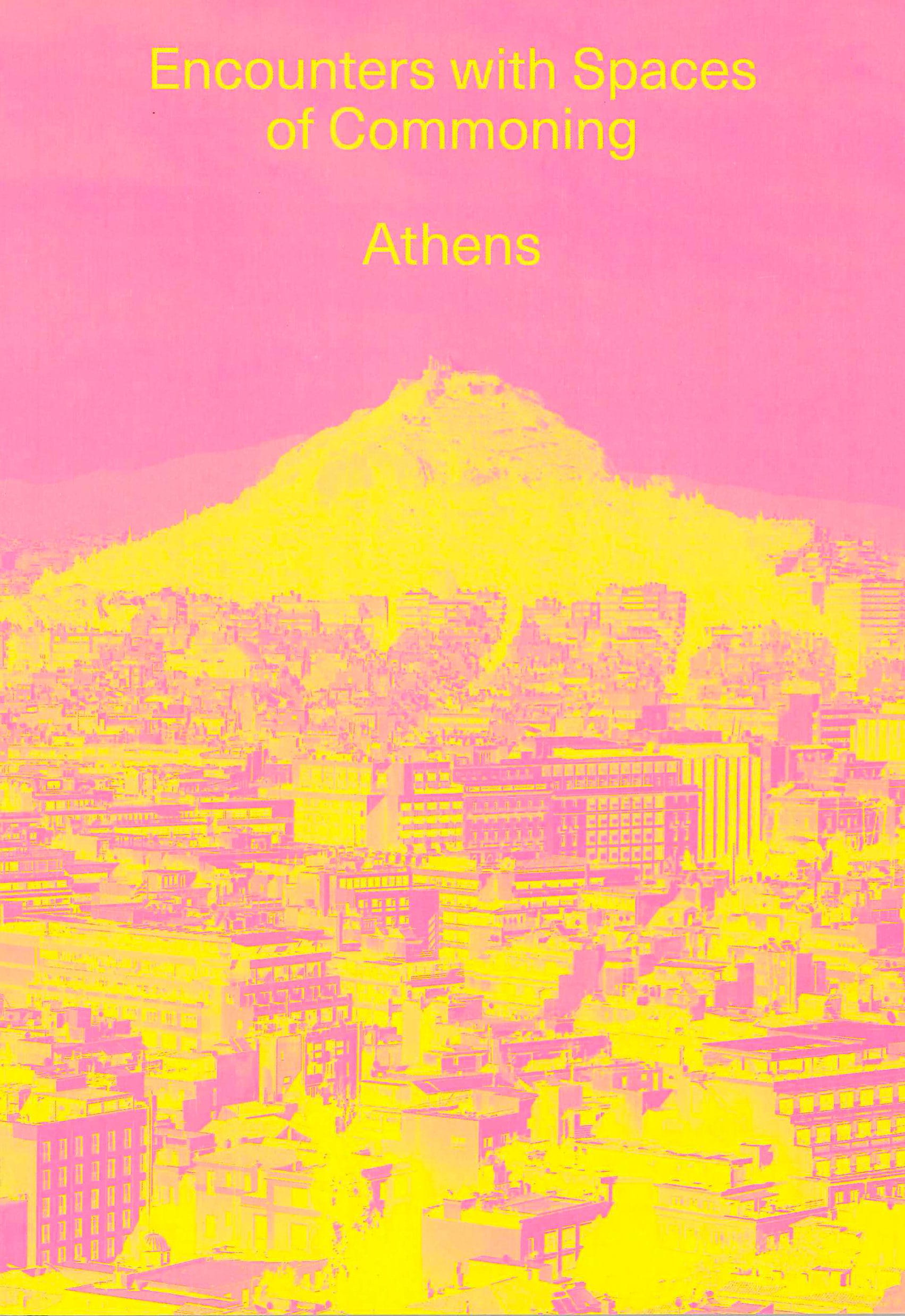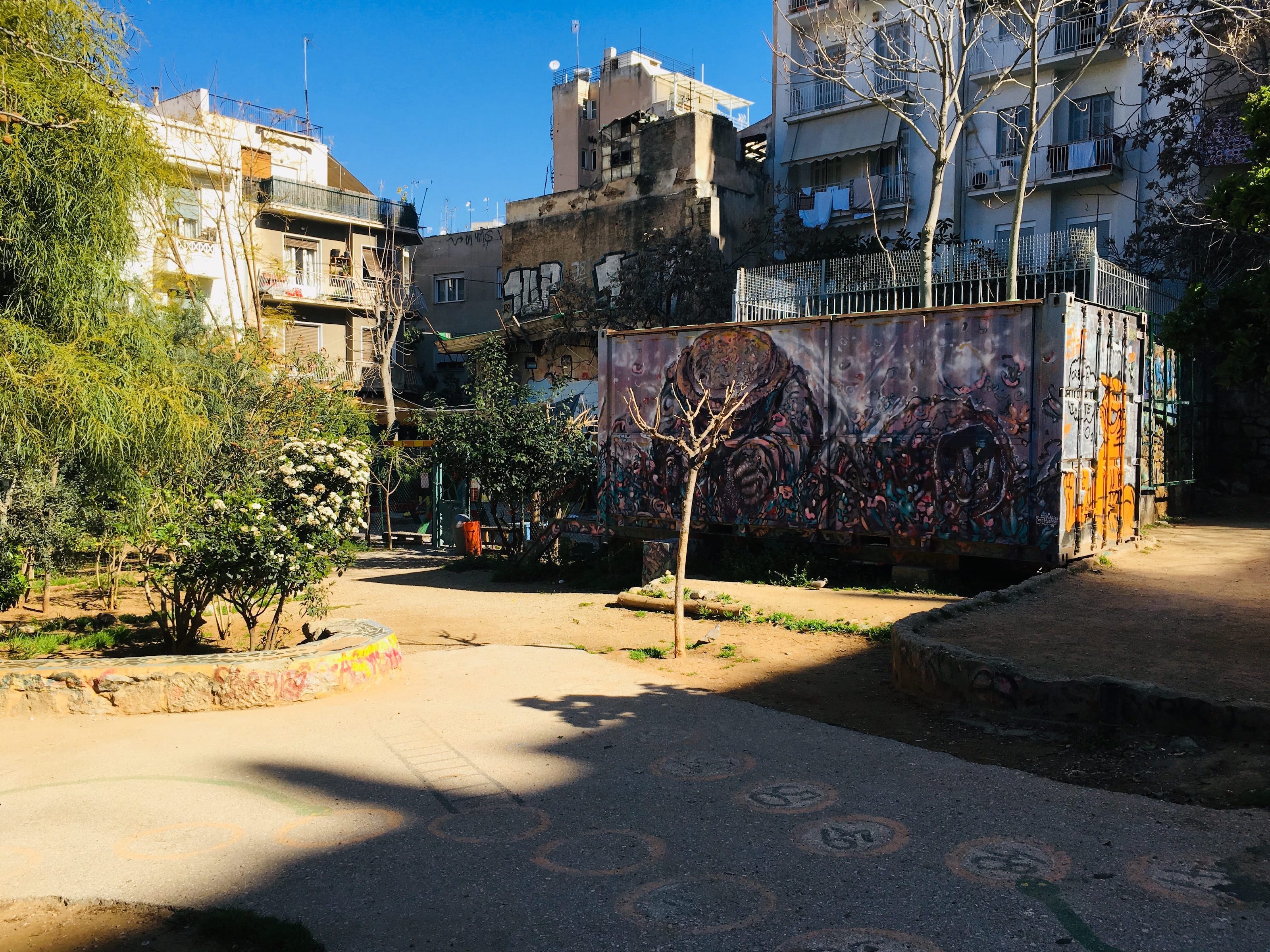Encounters with Spaces of Commoning. Athens. March 2019

Why did we go to Greece? Why Athens? To visit the Acropolis, the Agorá, and historical sites, of course! However, there were other reasons that drew, almost hauled, us to this country, to this city and prompted our interest. To begin to explore these reasons, we need to travel back to the year 2010 — the 23rd of April, to be precise. On that day, the former Prime Minister of Greece, Giorgos Papandreou, asked the European Union for financial aid. In retrospect, many anticipated this event: Greece’s rising debt was no secret. But only then, in 2010, in an effort to avoid national bankruptcy and jeopardisation of the European project, the EU, together with the International Monetary Fund, began supplying Greece with billions of euros in ‘aid’. Yet this aid was not simply an act of good will; but was administered under a set of stringent conditions. In fact, the adverse effects of these austerity measures and comprehensive reform programmes reverberate throughout the country into the present day. Today, as officials in Brussels claim that the Greek economy has since recovered from the crisis, the situation on the ground suggests otherwise. Rampant poverty, insolvent industries, the doubling of an otherwise already high unemployment rate, the decimation of the gross national product (which has fallen by a quarter since 2010), or the exodus of young people seeking jobs and security elsewhere, all reveal how the effects of the crisis are still very much present. Much of these difficulties arose from the social and economic reforms which set out to rescue the economy by reducing the public debt. So goes the rhetoric, at least. However, it meant drastic restructuring and divesting from institutions and sectors: from health and education, to construction and agriculture. With such austerity measures in place, state and citywide services and funding — functions often accepted as a given — were either partially or fully dismantled. The consequence has been serious hardships, breaks, chasms, unexpected cracks and fissures in society at large. The state and its social provisions, once presupposed as a given and naturally reigning the city from above, no longer functioned.
For a digital version of the book click here.

In this vacuum other positions and situations emerged: shortcomings had to be bridged, responsibilities reinvented, existing institutions renegotiated and new ones founded. By describing these responses as ‘creative,’ the country, especially Athens, discovered their marketing potential. However, only obscuring and reframing the social realities, the emphasis on creativity has neglected the emancipatory potential that these responses hold: self-organisation and the coexistence with other institutions.
And yet, it was exactly these social realities behind the image campaigns that we wanted to engage with. There we found emancipatory potential, a sort of hope — if you want to call it such — that drew us in. We wanted to stroll through the different situations and conditions that exist alongside the more externally-controlled political landscape, long preoccupied with selling off of the cultural, natural and national assets. We wanted to discuss other possibilities; visit places in the city that understood ‘aiding’ not in economic terms, but as a necessary human quality. We wanted to encounter places and spaces that were not the products and articulations of faceless political bodies, but ones directly negotiated among local populations, in neighbourhoods and beyond. We wanted to examine buildings, not those defined by the real estate market, but rather, those which proposed new forms of living and different modes of togetherness.
So for us, Athens is a place that has reacted (and is still reacting) to the demands forcibly induced by external powers from which — perhaps — new and creative programmes emerged. However, the city’s importance does not result from its marketability and ultimately commodifiable creativity. Instead, it comes from something else: it is this active search for modes of caring, empathy and other — more responsible — forms of togetherness that we want to highlight. In the end, this is what brought us to Athens.

This publication attempts to trace this very journey. It talks of and documents our explorations and experiences in Athens. It is partial. It is personal. It is extremely subjective. It covers the intense and extremely emotional encounters with the people we met and places we visited. We cooked. We danced. We walked — a lot! But perhaps most importantly, we listened intently. We came across openness, hospitality, and a sincere desire to share stories — complex ones at that. Many of struggles, sometimes those for basic existence. Throughout our journey, regardless of their exhaustive circumstances, we were stunned by the sheer persistence, raw strength and clarity in which people formulated their principles of solidarity — time and again. Such encounters, in turn, inspired us to look more closely at the spaces of our everyday life: how they are produced, and by whom; how and why trajectories emerge; how disparate ambitions and motivations lead to shared stories.
We would like to thank those who welcomed us into their lives and thoughts with such power: Click and The Mandela Girls who introduced us to some South African Dance moves, Constantina who talked with us about the development of the city, Elli, Nektaria and Athanasia of the neighbourhood initiative of Navarinou Park, Dafni who founded KCH Law Office, Demetra of Big Olive who told us tales of the ancient and modern city, Dorothea of Victoria Square Project, Gigi who was an integral part of the early occupation of Empros Theatre and, with Kostas, is part of the Mavili Collective, Ioannis of the Polykatoikia in Neo Faliro, Keti and Alex of the Social Cultural Centre Byron in Vyronas, Maria and Konstantin of the social polyclinic and pharmacy KIFA, Konstantinos and Yannis of O Allos Anthropos, Stavros of the National Technical University of Athens — and everyone else who we met along the way. Thank you all!
One final note, before you begin paging through the book. While we do credit the individuals who took the photos featured here, we decided not to do so with the various authors: you will not find any names corresponding to the texts. We came to this decision on the basis that these texts could not have been written without the stories and input we gathered along the way. In this sense, we understand them as the result of a shared and collective production process. To denominate single authors would have been untrue to this way of doing. This did not happen to deny the responsibility that comes with writing and producing knowledge, but reflects our attempt to restrain from any illusions of individual ownership of words.